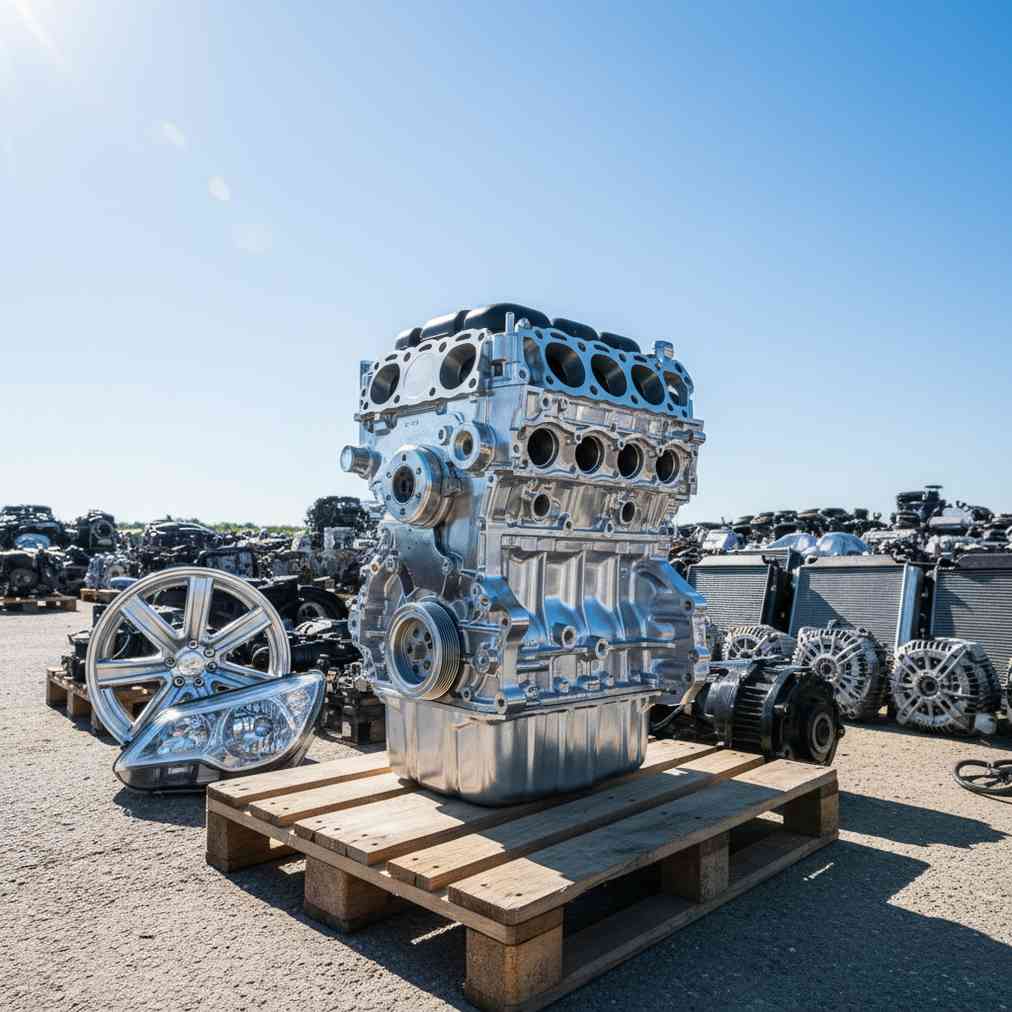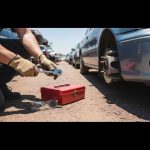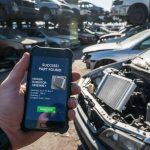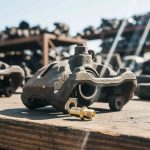The Reality of Selling Cars with Missing Parts
Many car owners wonder if they can get cash for a car with missing parts. The answer is a resounding yes! Even incomplete vehicles hold significant value for various reasons, primarily for their salvageable components and the scrap metal they contain. Whether your car is missing an engine, transmission, doors, or other major components, specialized buyers and cash-for-cars services are willing to purchase these vehicles.
The automotive recycling industry processes millions of vehicles annually, with over 27 million vehicles retired from use each year in North America alone. This massive market ensures there’s always demand for parts and materials, regardless of a vehicle’s completeness.
Why Cars with Missing Parts Still Have Value
Salvageable Parts and Components
Cars with missing parts remain valuable because other components may still be intact and highly sought after. High-value auto parts that buyers frequently need include:
- Catalytic converters – Contain precious metals like platinum and rhodium
- Airbags – Expensive safety components with strong resale demand
- Body panels – Doors, fenders, and hoods for collision repair
- Interior components – Seats, dashboards, and electronic systems
- Wheels and tires – Popular aftermarket items
- Electronic modules – ECUs, navigation systems, and control units
Even if your car is missing major components like the engine or transmission, these remaining parts can provide substantial value to auto recyclers and U-pull-it junkyards.
Scrap Metal Value
Regardless of missing parts, every vehicle contains valuable scrap metal. Auto recyclers often base their offers on the weight of recoverable metal from the vehicle’s frame and body. According to industry data from junkyard payment guides, this scrap value alone can range from $50 to $250 for vehicles with significant missing components.
Typical Cash Offers for Cars with Missing Parts
Understanding what to expect financially helps set realistic expectations. The value depends on several factors including vehicle size, remaining parts, and current scrap metal prices.
| Vehicle Type & Condition | Typical Payout Range |
|---|---|
| Small Compact Car (Missing Engine) | $50 – $150 |
| Midsize Sedan (Missing Transmission) | $100 – $250 |
| SUV/Truck (Missing Major Parts) | $150 – $400 |
| Luxury Vehicle (Partial Components) | $200 – $500 |
| Complete Running Vehicle (Comparison) | $300 – $1,200 |
These figures come from industry data compiled by Pull-A-Part’s valuation guides and represent realistic expectations for vehicles with significant missing components.
Where to Sell Your Incomplete Vehicle
Professional Cash-for-Cars Services
Many companies specialize in purchasing vehicles in any condition. These services offer several advantages:
- Instant quotes – Often provided online or by phone
- Free towing – Eliminates transportation costs
- Quick processing – Same-day cash transactions possible
- No prep required – Accept vehicles as-is
Auto Salvage Yards and Junkyards
Local salvage operations like U-pull-it auto salvage yards frequently purchase incomplete vehicles. They assess value based on:
- Remaining usable parts – Components they can resell
- Vehicle weight – Scrap metal recovery potential
- Market demand – Popular makes and models command higher prices
- Part availability – Rare or high-demand components increase value
Scrap Metal Dealers
When other options don’t work out, selling junk cars per ton to scrap yards provides a baseline value based purely on metal content. Current scrap prices fluctuate but typically range from $100 to $300 per ton.
Factors That Affect Your Car’s Value
Which Parts Are Missing
Some missing components impact value more than others. According to valuable car parts analysis, the most significant value losses occur when these components are absent:
- Engine and transmission – Reduce value by 40-60%
- Catalytic converter – Worth $50-$500 depending on vehicle
- Airbags – Can be worth $200-$1,000 per set
- Electronic control modules – High-value components for modern vehicles
Vehicle Age, Make, and Model
Certain vehicles maintain higher value even when incomplete. Popular models like Honda Accord and Honda Civic have strong parts demand, while Ford F-150 trucks command premium prices due to their popularity.
Current Market Conditions
Several market factors influence pricing:
- Scrap metal prices – Fluctuate based on global commodity markets
- Parts demand – Seasonal variations and regional preferences
- Inventory levels – Salvage yards pay more when specific parts are scarce
- Environmental regulations – Proper recycling requirements add value
Whole Car vs. Parting Out: Which Pays More?
Many owners wonder whether to sell their vehicle whole or part it out individually. Each approach has distinct advantages and disadvantages.
Selling the Complete Vehicle
Advantages:
- Quick and convenient – Usually completed in one transaction
- No additional work required – Buyer handles all parts removal
- Immediate payment – Cash in hand within hours
- Free towing typically included – No transportation costs
Disadvantages:
- Lower total payout – Buyers need profit margin for parts resale
- No control over individual part values – Can’t capitalize on high-value components
Parting Out Individual Components
Advantages:
- Higher total return – Can achieve 200-400% more than whole car sales
- Capitalize on valuable parts – Sell high-demand components at premium prices
- Multiple revenue streams – Different buyers for different parts
Disadvantages:
- Time-intensive – Can take months to sell all components
- Requires storage space – Need area to dismantle and store parts
- Tool and knowledge requirements – Must know how to safely remove components
- Disposal costs – Responsible for remaining scrap and hazardous materials
How to Get the Best Price for Your Incomplete Vehicle
Get Multiple Quotes
Don’t settle for the first offer. Contact several buyers including:
- Local salvage yards – Often provide competitive offers for pickup
- Cash-for-cars companies – Convenient but may offer lower prices
- Scrap metal dealers – Good baseline for minimum value
- Auto recyclers – Specialized in parts recovery
Be Accurate About Missing Parts
Honesty ensures accurate quotes and prevents disappointment during vehicle inspection. Provide detailed information about:
- Which specific parts are missing – Engine, transmission, wheels, etc.
- Condition of remaining components – Working, damaged, or unknown status
- Vehicle accessibility – Whether it can be moved or needs special equipment
- Title status – Clean, salvage, or missing title affects value
Understand Current Market Conditions
Stay informed about factors affecting your vehicle’s value by checking junk car value calculators or consulting current salvage price lists. Scrap metal prices change frequently, sometimes affecting offers by 20-30%.
Environmental Benefits of Selling Your Incomplete Vehicle
Selling your car with missing parts to legitimate recyclers provides significant environmental advantages:
- Proper fluid disposal – Professional handling of oil, coolant, and brake fluid
- Metal recycling – Reduces need for new metal production
- Parts reuse – Extends life of other vehicles through component availability
- Hazardous material management – Safe handling of batteries, mercury switches, and refrigerants
The automotive recycling industry prevents millions of tons of waste from entering landfills annually while providing affordable used auto parts to consumers.
Common Myths About Selling Cars with Missing Parts
Myth: No One Wants a Car Missing Its Engine
Reality: Vehicles missing engines still contain valuable components like transmissions, body panels, interior parts, and electronic systems. Many buyers specifically seek these vehicles for parts inventory.
Myth: Missing Parts Mean No Value
Reality: Even heavily stripped vehicles retain scrap metal value and may contain overlooked valuable components. The automotive recycling industry has buyers for virtually any vehicle condition.
Myth: You Need All Paperwork for Incomplete Vehicles
Reality: While titles are preferred, many buyers work with vehicles that have missing or problematic paperwork, especially for scrap-value transactions.
Step-by-Step Guide to Selling Your Incomplete Vehicle
Follow these steps to maximize your return when selling a junk car:
- Document missing parts – Create detailed list of absent components
- Research buyer options – Contact multiple salvage yards and cash-for-cars services
- Get written quotes – Obtain offers from at least 3-5 buyers
- Verify buyer credentials – Ensure proper licensing and insurance
- Prepare vehicle access – Clear path for tow truck if needed
- Remove personal items – Check all compartments thoroughly
- Complete transaction – Get receipt and title transfer documentation
Special Considerations for High-Value Vehicle Brands
Certain makes and models retain higher value even when incomplete due to parts demand:
Luxury and European Vehicles
BMW, Mercedes-Benz, Audi, and other premium brands often have higher parts values due to expensive replacement costs. Even missing major components, these vehicles can command $300-$800 from specialized buyers.
Popular Domestic Models
High-volume vehicles like Dodge Charger and Ford models maintain strong parts demand. Buyers actively seek these vehicles for inventory even when incomplete.
Trucks and SUVs
Larger vehicles typically bring higher offers due to:
- Greater scrap metal weight – More material to recycle
- Higher parts demand – Commercial and work vehicle needs
- Valuable components – Truck-specific parts often cost more new
Red Flags to Avoid When Selling
Protect yourself from scams and unfair practices by watching for these warning signs:
- Requests for upfront payment – Legitimate buyers never charge sellers
- Pressure tactics – Avoid buyers demanding immediate decisions
- Unrealistic offers – Quotes significantly above market rates may be scams
- No business documentation – Verify licensing and insurance coverage
- Cash-only transactions – Prefer buyers offering check or electronic payment
Research potential buyers through reputable wrecked vehicle buyer directories and read customer reviews before committing.
The Future of Incomplete Vehicle Sales
Several trends are shaping the market for vehicles with missing parts:
Electric Vehicle Impact
The impact of electric cars on salvage yards is creating new opportunities. EV batteries and components command premium prices, making incomplete electric vehicles particularly valuable.
Technology Integration
Online platforms increasingly provide instant quotes and streamlined transactions, making it easier than ever to sell incomplete vehicles. Mobile apps and digital documentation reduce paperwork and processing time.
Regulatory Changes
Stricter environmental regulations increase the value of proper vehicle recycling, potentially raising offers for all vehicle conditions as compliance costs rise.
Getting Your Quote Today
Don’t let missing parts prevent you from getting cash for your vehicle. The automotive recycling industry has buyers for virtually any vehicle condition, and you may be surprised by the offers available.
Take action today:
- Contact multiple buyers – Get at least 3-5 quotes for comparison
- Be honest about condition – Accurate descriptions lead to realistic offers
- Consider your time value – Weigh convenience against potential higher returns
- Act promptly – Scrap prices and demand fluctuate regularly
Remember that every vehicle has value, regardless of missing components. Whether you choose to sell to cash for junk cars services, local salvage yards, or part out components individually, options exist to convert your incomplete vehicle into cash.
The bottom line is clear: cars with missing parts absolutely have cash value. From salvageable components to basic scrap metal content, buyers throughout the automotive recycling industry stand ready to make offers. Don’t let an incomplete vehicle sit unused when it could be converted to cash while contributing to environmental sustainability through proper recycling.





Leave a Reply
You must be logged in to post a comment.